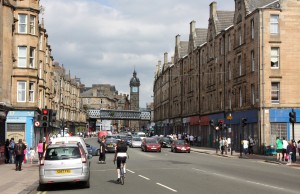 At The Scotsman, Euan McColm writes about the controversy surrounding Creative Scotland’s grant to artist Ellie Harrison, who will live in Glasgow for a year without leaving, in order to personally document what is known in social science as the ‘Glasgow effect’, whereby various measures of quality of life are markedly lower in and around Glasgow than anywhere else in the UK, if not the entire EU.*
At The Scotsman, Euan McColm writes about the controversy surrounding Creative Scotland’s grant to artist Ellie Harrison, who will live in Glasgow for a year without leaving, in order to personally document what is known in social science as the ‘Glasgow effect’, whereby various measures of quality of life are markedly lower in and around Glasgow than anywhere else in the UK, if not the entire EU.*
McColm’s views are similar to mine: the project seems a bit iffy, but he respects the decision of Creative Scotland to fund it:
If we are agreed that there is value in supporting the arts (and that’s my position) then we must guard against decisions on funding being influenced by public outrage.
Creative Scotland – imperfect, as all such organisations are by dint of the fact that they are run by human beings – is charged with responsibility for doling out funds. Of course, it’s legitimate to look at where our money goes. If there were questions, for example, about a disproportionately high degree of funding going to artists who loudly proclaimed support for a political party, then we might have cause to call for intervention in the work of Creative Scotland.
But, clunky as the system might be, we can’t allow protests to overturn decisions to fund projects.
There is a big question here that applies to the sciences as well as the arts: how should funding choices be made when there are many more proposals received than funds available? The answer we have adopted in both research and art is the peer review panel. It is ‘arm’s length’, independent of political processes in its decisions; though of course it lies in the political sphere to set the rules and funding for the panel, politics does not then intervene in the judgments, even when members of the public are displeased.
In the U.S., we get stories every year about silly science projects, regarding shrimp on a treadmill, or gambling monkeys. Sometimes – usually – there are sound rationales behind the research, indeed with very practical implications. Some of the studies will, in the end, not amount to much. The same situation applies in the arts. There will be grants that, in retrospect, turn out to have been not worth the funding.
But we have no better method than peer review. Every other option for deciding how arts funds should be allocated is worse. Arts and science funding through the legislative process would be hopelessly tainted by temporal political considerations and influence. A vote by the public sounds democratic, but it would reduce funding on projects to popularity contests, and with all the problems that come from choosing a means of voting.
I have sometimes questioned the value of projects funded through arts councils. But I support funding for artists, especially ones who want to try something new – the spin-off benefits of innovation might be very large indeed from some projects. But I want those decisions made through a panel of diverse, talented artists, even when I might question the results. Ellie Harrison doesn’t have a ‘right’ to funding – the public has to decide in the first place whether it wants to fund the arts. But Creative Scotland has been empowered with the right to choose to whom to make its grants, and whilst we have a right to grumble, we should respect the process.
- Disclosure: my mother was born in Holytown, on the outskirts of Glasgow. If you pronounce the last syllable ‘town’ as rhyming with ‘gown’, you’re doing it wrong.

Our NEA along with most state arts organizations have squelched the peer review process by requiring visual artists to apply for grants through a local partnered arts organization, which is a type of funding through public not peer consensus. If I bring an idea to an arts organization I’m most likely not peer reviewed but reviewed by a board or non artists.
I agree with you on this Michael, but what is important I think is the transparency of those arts council decisions. Unlike research funding councils, the reviewers’ comments aren’t fed back to applicants, and other than the names of the people on the peer review panels, there is no further information about how these (often) aesthetic decisions are taken.
I’ve talked to Creative Scotland about this informally in the past, it would be great to see a higher degree of public transparency about decisions, or even metrics about numbers of applications, total pots and funding decisions.